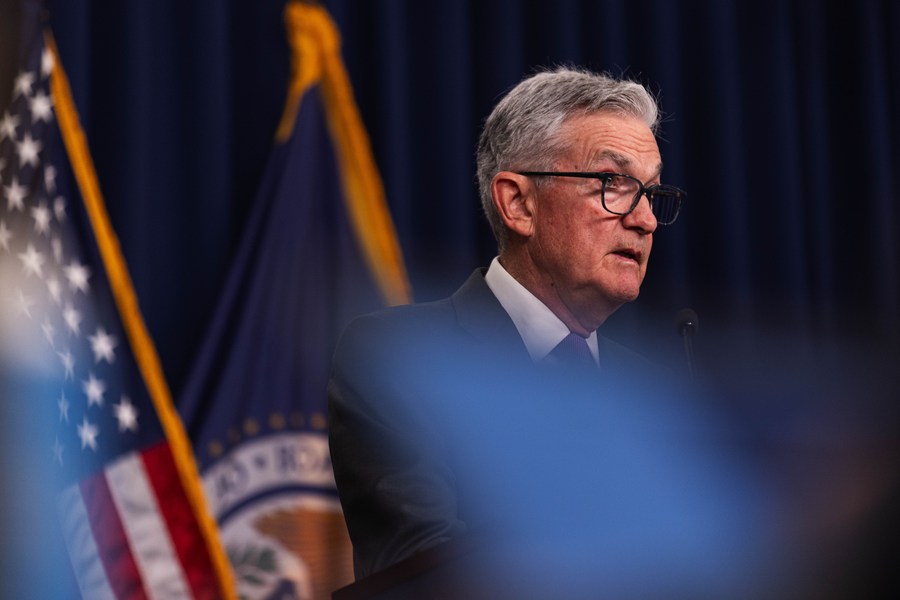
U.S. Federal Reserve Chair Jerome Powell attends a press conference in Washington, D.C., the United States, on July 26, 2023. (Photo by Aaron Schwartz/Xinhua)
The rising interest rate has lowered demand but pushed up borrowing costs -- and made debt distress or default a very real concern among chief risk officers, with almost a quarter saying debt is "highly likely to have a severe impact on their organization" this year, according to a recent survey by the World Economic Forum.
WASHINGTON, July 28 -- After a pause in June, the U.S. Federal Reserve on Wednesday increased interest rates by 25 basis points, taking benchmark borrowing costs to the highest level in over two decades, and inching closer to the end of the current tightening cycle.
Higher interest rates resulting from continued rate hikes have slowed U.S. economic growth, strained the financial system, and exacerbated the already heavy U.S. government debt burden, all of which could have global spillover effects.
Aside from that, the sharp rate hikes by U.S. Fed and other central banks in advanced economies have added debt servicing costs for emerging markets, and pushed up interest rates in emerging economies, which could worsen global financial turmoil and boost downside risks to the global economy.
Since the start of this tightening cycle in March 2022, the Fed has raised interest rates 11 times in a row, with a cumulative increase of 525 basis points, the fastest pace of rate hikes since the 1980s.
The Fed's announcement came a day after PacWest, which had seen its shares tumble due to a substantial drop in deposits earlier this year, said it would be sold to Banc of California, a smaller lender.
This is just another example of how the Fed's aggressive rate hikes have shaken the banking sector, following the closure of Silicon Valley Bank and Signature Bank in March and the closure of First Republic Bank in early May.
"My expectation is that we will get a significant number of other regional banks failing as a fallout from high Fed interest rates and the real commercial property crisis," Desmond Lachman, a senior fellow at the American Enterprise Institute and a former official at the International Monetary Fund (IMF), told Xinhua.
"Ripple effects of U.S. financial-system strains could lead to tighter credit, sharper slowdown worldwide," according to a report by The Wall Street Journal earlier this year. "Turmoil in the U.S. banking sector isn't just a problem for the U.S. It also increases the risks of a global recession."
The spillover effects of the Fed's aggressive rate hikes go far beyond.
Due to the dominant role of the U.S. dollar in the global financial system, rate hikes have lifted U.S. bond yields and strengthened the U.S. dollar, prompting large-scale capital flow from emerging markets to the United States, and sending shockwaves through the financial markets of many countries.
These countries are then forced to hike interest rates faster and higher, posing risks to their own economic development.
As the value of other currencies tumbles, it will be more expensive for these countries to import food and fuel, which allows the United States to essentially export inflation, adding pressure on these central banks.
In addition, Lachman noted that higher interest rates push up debt servicing costs for emerging markets, intensifying debt risks for highly indebted emerging market economies.

Pedestrians walk past the National Debt Clock in New York, the United States, on June 1, 2023. (Xinhua/Li Rui)
"Borrowing costs for emerging markets and developing economies remain high, constraining room for priority spending and raising the risk of debt distress," the International Monetary Fund (IMF) said in the latest World Economic Outlook Update.
The Washington-based organization said the rise in central bank policy rates to fight inflation continues to weigh on economic activity, and plausible risks to the global economy -- including persistent inflation, financial markets repricing, and growing debt distress -- continue to be skewed to the downside.
For companies, more of them will need to refinance in a high-interest rate environment, and sustained high interest rates could trigger a wave of global corporate defaults.
The rising interest rate has lowered demand but pushed up borrowing costs -- and made debt distress or default a very real concern among chief risk officers, with almost a quarter saying debt is "highly likely to have a severe impact on their organization" this year, according to a recent survey by the World Economic Forum.
Moody's Investors Service has estimated that global defaults on risky debt will peak at 5.1 percent early next year, adding that in a severely pessimistic scenario, defaults on risky debt could hit 13.7 percent in a year, even higher than the 13.4-percent peak reached during the 2008 financial crisis.












